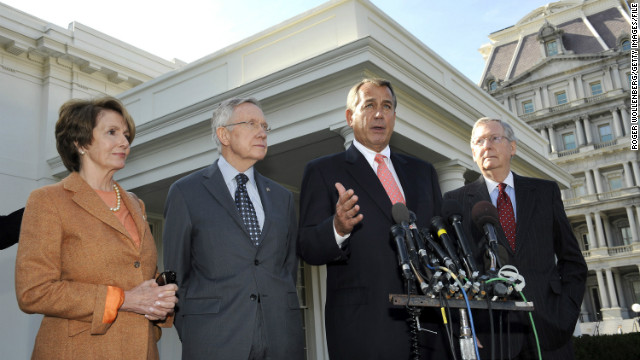 |
| Image from CNN's Political Ticker |
This week, with all the expected pomp and tradition, the newly-elected
114th Congress convened for the first time. Not only were 13 new
Senators and 58 new Representatives sworn in, but both houses of Congress are
also in Republican control for the first time since 2006. With a fresh crop of
legislators, the Republican Party has the potential to really change things up,
set the political agenda for the next two years—and make a case for a
Republican president in 2016.
Things started to get interesting prior to January 6th,
and the upcoming vote for House leadership, when a small, but significant group
of representatives announced they would not be voting for John Boehner for
Speaker of the House. Boehner has held the position of Speaker since 2011, and
successfully held off a dozen party defectors in 2013. The list of Republicans
joining the “dump Boehner” wagon grew to 25,
with representatives taking to Facebook to announce their petition for a new
Speaker. Rep. Jeff Duncan (R-S.C.) wrote on Facebook: “A fresh
start often requires change, and I believe that change should start with the
election of a new Speaker.” Ultimately, however, the conservative scheme
failed, with a majority of House Republicans confirming Boehner.
And here we get to the crux of the matter—can a Congress
really be “new” if all the leaders are the same? Sure, we have 71 new legislators,
but they are all beginners—inexperienced and unlikely to have a lot of
influence. Congress’ organization is all about hierarchy. Representatives with
the most experience—and time in office—get spots on the most powerful
committees and the committee leadership positions. First-time congressmen and
women won’t be given the plumb positions because they don’t have the
connections and they haven’t proved themselves capable legislators yet.
A fiery member of Congress will probably get amplified by
the media and become a maverick favorite, but at the end of the day, leadership
positions really do matter. Congressional leaders have a tremendous amount of
influence. In the House, Committee heads determine which bills actually make it
past the committee to the Rules Committee for a vote. The Rules Committee is
the most powerful committee in the House by far. It controls many aspects of
how the House runs—from how long representatives have to discuss a bill on the
floor, to how many bills can come up for vote each day—and even which bills get
voted on at all. The Speaker essentially controls this committee by supporting
favorable representatives to fill its slots. Boehner’s power was in full
display when he confirmed
that the Rules Committee had agreed to vote out two of its members who acted
against Boehner—Rep. Daniel Webster (R-Fla.) and Rep. Richard Nugent (R-Fla.).
Although Boehner’s retributive action hasn’t been finalized,
things don’t look good for his enemies in the House. And it doesn’t look like
we’re going to have a fresh perspective in either house of Congress. Not only
was Boehner reconfirmed, but Senator Mitch McConnell (R-KY), who served as Senate
Minority Leader from 2007-2015, was also voted in as Senate Majority Leader. On
the Democratic side, Senate Minority Leader Harry Reid (D-NV) and House
Minority Leader Nancy Pelosi (D-CA) retained their powerful positions as well.
We should feel more than a little worried about leadership
stagnation in Congress. Not only has this Congress passed fewer
bills than any other Congress in recent history, but friction between members
of Congress and President Obama has also led to Congress’ embarrassing approval
ratings. Only 14% of Americans approve of Congress—and in August, for the first
time, 51% of Americans revealed that they don’t approve
of their own members of Congress. Yikes. The only way to reverse these trends
is to welcome change and buck the status quo—starting with congressional
leadership. Although Congress missed its opportunity to select new leaders, we
can only hope that our representatives will commit to some New Years’
Resolutions: tackling the tough issues like Social Security and immigration,
and compromising when it will lead to a better outcome for Americans.








